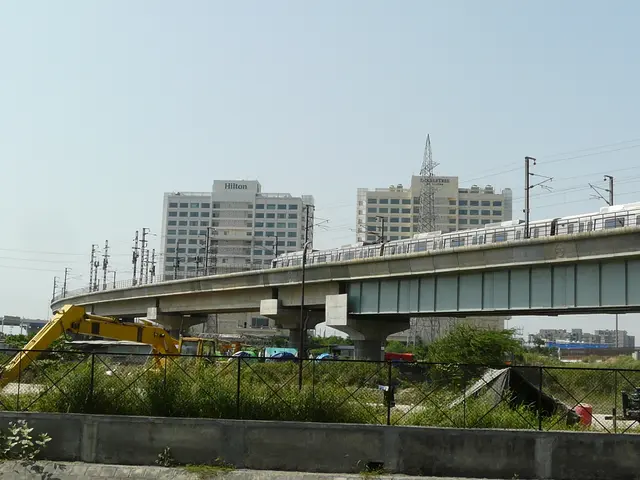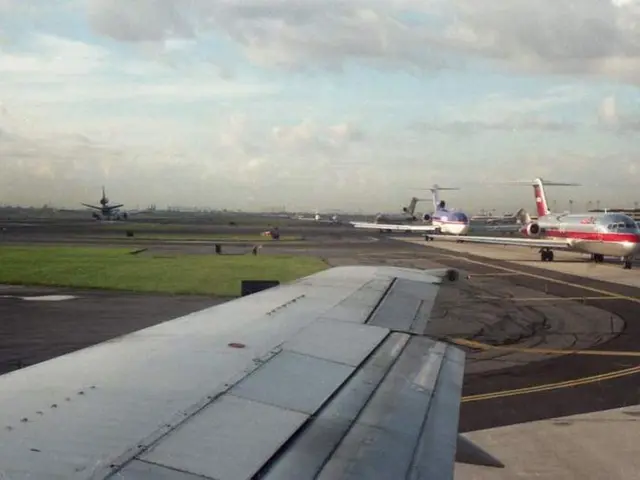Torrential rain warnings issued by Prime Minister Shehbaz as floods wreak havoc in KP province
Pakistan Steps Up Flood Relief Efforts and Addresses Illegal Constructions
In the aftermath of the devastating floods that have hit Pakistan, Prime Minister Shehbaz Sharif has taken several measures to aid the affected population and prevent future disasters.
During a visit to flood-hit areas in Khyber Pakhtunkhwa (KP), the Prime Minister announced seven days of free electricity for flood victims. He also pledged that electricity would be restored everywhere in a week, regardless of unpaid bills.
The Prime Minister commended the commitment of Field Marshal Asim Munir's officers, praising them for directing the armed forces to aid flood-hit populations. He also expressed appreciation to Field Marshal Munir and KP Chief Minister Ali Amin Gandapur for their support during this difficult time.
PM Shehbaz emphasized the need for unity, stating that the federal government would work with KP, Gilgit-Baltistan (GB), and other provinces without politics in a time of national crisis. He also mentioned the disbursement of Rs100 billion by the federal government for rehabilitation after the 2022 floods, and relief cheques were distributed during his visit.
The Prime Minister acknowledged that while floods are natural catastrophes, the resulting massive losses are significantly due to man-made factors such as unauthorized constructions and deforestation. He highlighted deforestation and unchecked mining as factors that intensified the disaster in KP, where over 350 people have lost their lives.
Illegal constructions on waterways have been identified as major contributors to flood disasters and human casualties during torrential rains, notably in Khyber Pakhtunkhwa. These illegal constructions impede natural water flow, reduce floodplain capacity, and exacerbate flooding, leading to higher mortality and displacement.
To address this issue, the government is focusing on coordinated governmental action to regulate and remove illegal constructions on waterways. The Prime Minister has tasked a ministerial committee and officials to curb these illegal activities and is seeking cooperation with provinces to improve enforcement and disaster preparedness.
However, effective enforcement, accountability, and sustained institutional commitment remain major challenges in preventing recurring flood impacts. Reports criticize the selective enforcement of laws, noting that structures destroyed in past floods have often been rebuilt illegally in the same vulnerable areas without accountability for authorities who allowed it.
The Prime Minister stressed the need for strict policies to prevent future building on natural water channels and reiterated Pakistan's extreme vulnerability to climate change. He warned of further spells of heavy rain and emphasized the importance of collective action, including the preservation of forests, to help mitigate future disasters.
In conclusion, Pakistan is currently focusing on coordinated governmental action to regulate and remove illegal constructions on waterways, recognizing their critical role in worsening flood disasters. However, effective enforcement, accountability, and sustained institutional commitment remain major challenges in preventing recurring flood impacts.
Read also:
- Amidst India's escalating climate crisis, transgender individuals continue to persevere
- Germany's three-month tenure under Merz's administration feels significantly extended
- Governing body allegedly persists in enjoying vacation time amidst Spain's highest danger level due to fires, claims Feijóo
- United Nations Human Rights Evaluation, Session 45: United Kingdom's Statement Regarding Mauritius' Human Rights Record








